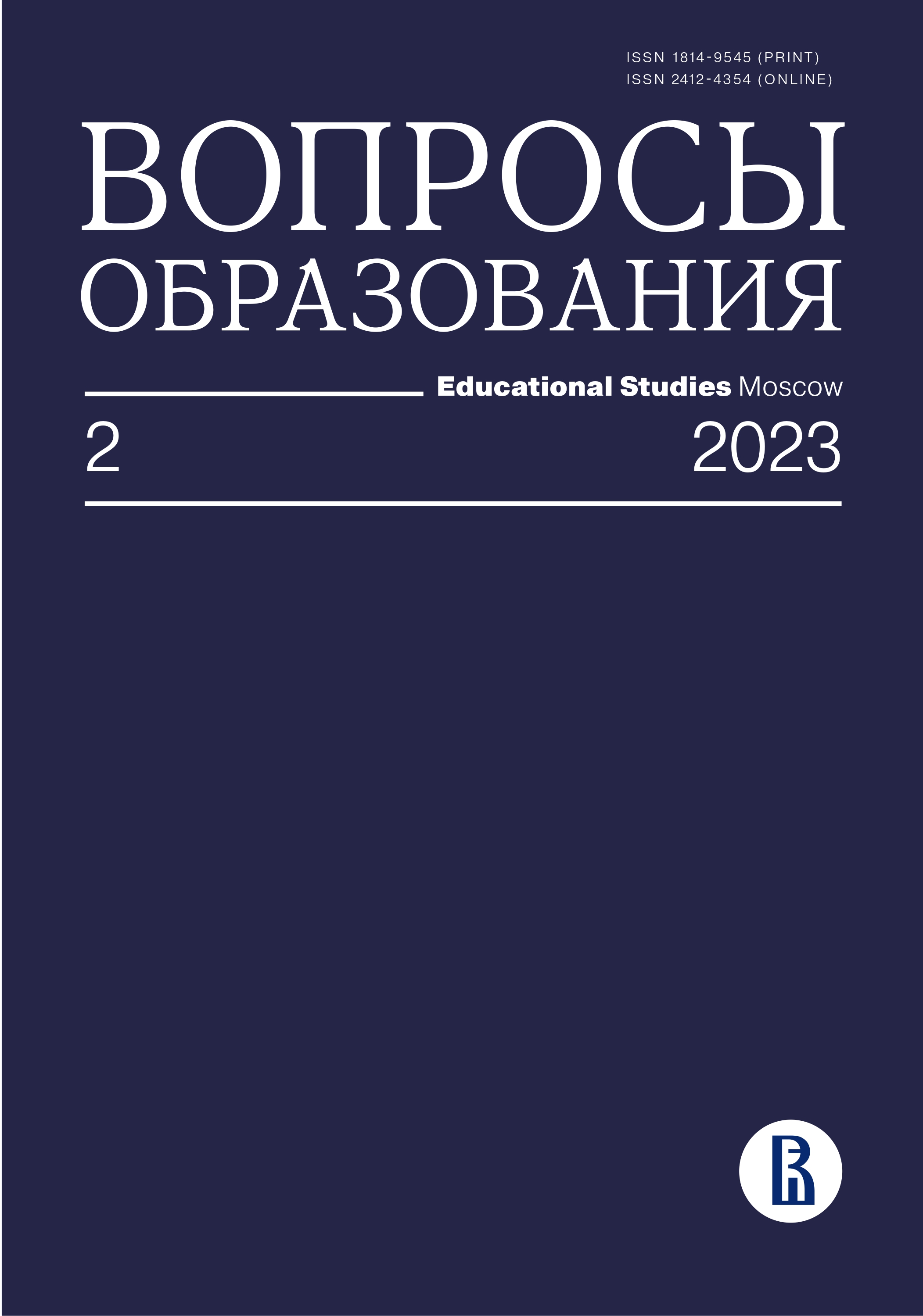Методический подход к формированию матрицы компетенций под запросы цифровой экономики
Аннотация
Проведено исследование с целью разработки методического подхода к формированию матрицы компетенций под запросы цифровой экономики. На основании обзора литературы проанализирована терминология по изучаемой проблеме, подходы к моделированию, этапы разработки моделей компетенций, уровни сформированности компетенций, принципы построения моделей и их структура. Проведен сравнительный анализ зарубежных моделей компетенций, разработанных для специалистов разных областей деятельности. Представлен авторский методический подход к разработке матрицы компетенций под запросы цифровой экономики.
Скачивания
Литература
Arifin M.A., Rasdi R.M., Anuar M.A.M., Omar M.Kh. (2017) Addressing Competency Gaps for Vocational Instructor through Competency Modelling. International Journal of Academic Research in Business and Social Sciences, vol. 7, no 4, pp. 1201–1216. http://dx.doi.org/10.6007/IJARBSS/v7-i4/2970
Baker D.E., Walsh M.B., Marjerison L. (2000) High-Performance Leadership at the Process Level. Advances in Developing Human Resources, vol. 2, no 2, pp. 47–72. http://dx.doi.org/10.1177/152342230000200204
Belolipetskaya A.E. (2021) Kompetentnostny instrumentariy upravleniya personalom organov publichnogo upravleniya [Competence Toolkit for Personnel Management in Public Administration Bodies]. Natural-Humanitarian Studies, no 1 (33), pp. 47–51. https://doi.org/10.24412/2309-4788-2021-10830
Beard D., Schwieger D., Surendran K. (2008) Integrating Soft Skills Assessment through University, College, and Programmatic Efforts at an AACSB Accredited Institution. Journal of Information Systems Education, vol.19, no 2, pp. 229–240.
Bernthal P.R., Colteryahn K., Davis P., Naughton J., Rothwell W.J., Wellins R. (2004) ASTD 2004 Competency Study: Mapping the Future: New Workplace Learning and Performance Competencies. Alexandria, VA: American Society for Training and Development.
Boyatzis R. (1982) The Competent Manager: A Model of Effective Performance. New York, NY: John Wiley & Sons.
Byham W.C., Moyer R.P. (1996) Using Competencies to Build a Successful Organization. Toronto: Development Dimensions International Inc., MCMXCVI. Available at: https://onpointcoaching.typepad.com/files/using_competancies_to_build_org.pdf (accessed 2 April 2023).
Chomsky N. (1965) Aspects of the Theory of Syntax. Cambridge, MA: M.I.T.
Chouhan V.S., Srivastava S. (2014) Understanding Competencies and Competency Modeling―A Literature Survey. IOSR Journal of Business and Management, vol. 16, no 1, pp. 14–22. http://dx.doi.org/10.9790/487X-16111422
Cochran G.R. (2009) Ohio State University Extension Competency Study: Developing a Competency Model for a 21st Century Extension Organization (PhD Thesis). Columbus: Ohio State University. Available at: https://etd.ohiolink.edu/apexprod/rws_etd/send_file/send?accession=osu1243620503&disposition=inline (accessed 14 April 2023).
Dneprovskaya N.V. (2018) Otsenka gotovnosti rossijskogo vysshego obrazovaniya k tsifrovoy ekonomike [Assessment of the Readiness of the Russian Higher Education for the Digital Economy]. Statistics and Economics, vol. 15, no 4, pp. 16–28. https://doi.org/10.21686/2500-3925-2018-4-16-28
Draganidis F., Mentzas G. (2006) Competency Based Management: A Review of Systems and Approaches. Information Management & Computer Security, vol. 14, no 1, pp. 51–64. http://dx.doi.org/10.1108/09685220610648373
Dubois D.D. (1993) Competency-Based Performance Improvement: A Strategy for Organizational Change. Amherst, MA: HRD.
Frank E. (1991) The UK′ s Management Charter Initiative: The First Three Years. Journal of European Industrial Training, vol. 15, no 6. https://doi.org/10.1108/03090599110142448
Jukova M.V., Kryukov D.V. (2022) Sovremenny trend razvitiya ekonomiki i obshchestva: tsifrovoe obshchestvo kak osobaya stadiya informatsionnogo obshchestva [Modern Trend in the Development of the Economy and Society: Digital Society as a Special Stage of the Information Society]. Society and Security Insights, vol. 5, no 2, pp. 120–139. https://doi.org/10.14258/SSI(2022)2-08
Khenner E.K. (2022) Informatsionnye tekhnologii v obrazovanii. Teoreticheskiy obzor [Information Technologies in Education. Theoretical Overview]. Perm: Perm State University. Available at: http://www.psu.ru/files/docs/science/books/uchebnie-posobiya/informacionnye-tekhnologii-v-obrazovanii.pdf (accessed 14 April 2023).
Le Deist F.D., Winterton J. (2005) What Is Competence? Human Resource Development International, vol. 8, no 1, pp. 27–46. https://doi.org/10.1080/1367886042000338227
Lucia A.D., Lepsinger R. (1999) The Art & Science of Competency Models: Pinpointing Critical Success Factors in Organizations. San Francisco, CA: Jossey-Bass.
McClelland D.C. (1973) Testing for Competence Rather Than for "Intelligence". American Psychologist, vol. 28, no 1, pp. 1–14. https://doi.org/10.1037/H0034092
Megahed N. (2018) A Critical Review of the Literature and Practice of Competency Modelling. KnE Social Sciences. http://dx.doi.org/10.18502/kss.v3i10.3106
Miroshnichenko M.A. (2021) Tsifrovaya transformatsiya: rossijskie prioritety formirovaniya tsifrovoy ekonomiki [Digital Transformation: Russian Priorities for the Formation of the Digital Economy]. Krasnodar: Kuban State University.
Nepochatykh E.H. (2013) Razvitie predstavleniy o ponyatiyakh "kompetentsiya" i "kompetentnost´" [The Development of Ideas about the Concepts "Competence" and "Competency"]. Nauchnye vedomosti BelGU. Seriya "Gumanitarnye nauki", vol. 19, no 20 (163), pp. 243–251.
Nikiforova L.V. (2009) Tolerantnost´ vs kompetentnost´ [Tolerance vs Competence]. Fundamental´nye problemy kul´turologii. T. 7: Kul´turnoe mnogoobrazie: teorii i strategii [Fundamental Problems of Cultural Studies. Vol. 7: Cultural Diversity: Theories and Strategies] (ed. D.L. Spivak), Moscow: Novy khronograf, pp. 63–70.
Postyushkov A.V. (2021) Problemy razvitiya obrazovaniya v usloviyakh tsifrovoy ekonomiki [Problems of Education Development in the Digital Economy]. Moscow: International Academy of Education.
Reznikova O.S. (ed.) (2018) Kompetentnostny podkhod v upravlenii personalom: teoriya, metodologiya, praktika [Competence Approach in Personnel Management: Theory, Methodology, Practice]. Simferopol: Arial.
Rogers C.R., Freiberg H.J. (1970) Freedom to Learn. Columbus, OH: Charles Merrill.
Rothwell W.J., Lindholm J.E. (1999) Competency Identification, Modelling and Assessment in the USA. International Journal of Training and Development, vol. 3, no 2, pp. 90–105. http://doi.org/10.1111/1468-2419.00069
Salman M., Ganie S.A., Saleem I. (2020) The Concept of Competence: A Thematic Review and Discussion. European Journal of Training and Development. http://dx.doi.org/10.1108/EJTD-10-2019-0171
Shim M.O. (2008) Competency Theory and Practice for Developing a Extension Competency Model. Journal of Agricultural Extension & Community Development, vol. 15, no 1, pp. 75–111. Available at: http://koreascience.or.kr/article/JAKO200819463976015.pdf (accessed 14 April 2023).
Spencer L.M., Spencer S.M. (1993) Competence at Work. Models for Superior Performance. New York, NJ: John Wiley & Sons.
Subochev N.S., Arkhipova T.G. (2016) Kompetentnostny podkhod v upravlenii personalom [Competence-Based Approach in Personnel Management]. Volgograd: Volgograd Institute of Management.
Whiddett S., Hollyforte S. (1999) The Competencies Handbook. London: Chartered Institute of Personnel and Development. https://doi.org/10.1108/cdi.1999.4.7.400.5
White R.W. (1959) Motivation Reconsidered: The Concept of Competence. Psychological Review, vol. 66, no 5, pp. 297–333.
Wong S.C. (2020) Competency Definitions, Development and Assessment: A Brief Review. International Journal of Academic Research in Progressive Education and Development, vol. 9, no 3, pp. 95–114. http://dx.doi.org/10.6007/IJARPED/v9-i3/8223
Zimnyaya I.A. (2009) Klyuchevye kompetentsii — novaya paradigma rezul´tata obrazovaniya [Key Competencies—a New Paradigm of Educational Outcomes]. Eksperiment i innovatsii v shkole, no 2, pp. 7–14.








